|

Winter 2006
(14.4)
Pages
74-78
BP Developments
East
Azeri Ahead of Shedule
by Tamam Bayatli
Communications Manager

 Left: East
Azeri platform in the Caspian has started production four months
ahead of schedule. It currently produces more than 90,000 barrels
per day from three of the eight pre-drilled wells. Photo: BP Left: East
Azeri platform in the Caspian has started production four months
ahead of schedule. It currently produces more than 90,000 barrels
per day from three of the eight pre-drilled wells. Photo: BP
With the start-up of
oil production from the East Azeri (EA) platform four months
ahead of schedule in October, BP completed Phase 2 of the Azeri-Chirag-Gunashli
(ACG) field development in the Azerbaijan sector of the Caspian
Sea. Phase 3, which will develop the Deep Water Gunashli area
of ACG, remains on schedule to commence production in 2008.
This major achievement represented
the hard work and dedication of more than ten thousand people
in Azerbaijan and other countries, who have delivered outstanding
performance on the East Azeri project over the past three years.
Today East Azeri produces more
than 90,000 barrels per day from three of the eight pre-drilled
wells. BP expects production to increase through 2007 as the
other pre-drilled wells are brought online, prior to platform
drilling which will begin this year.
On plateau, the EA facility will produce 260,000 barrels per
day, bringing total Azeri production, including West and Central
Azeri, to more than 800,000 barrels per day. Oil from EA is transported
via the new 30-inch subsea pipeline to the onshore Sangachal
Terminal.
Associated gas flows via in-field subsea pipelines to the Compression
and Water Injection Platform (C&WP) for re-injection into
the reservoir for pressure maintenance. Surplus gas is exported
via an existing subsea pipeline to the Sangachal Terminal and
onward to the Azerigas system for domestic use.
BTC Lifts 100th
Cargo
On February 6, the Baku-Tbilisi-Ceyhan (BTC) Pipeline, which
is operated by BP, celebrated the 100th cargo lifting at the
Ceyhan Terminal in Turkey. The 100th tanker - the Knock Sheen
- took on board in excess of one million barrels of oil - a quantity
that took 26 hours to load.
BTC has also achieved several other important milestones lately.
On February 5, 2007, it exported more than 600,000 barrels -
the highest daily flow-rate to date. Recently, the Ceyhan Terminal
saw the berthing of the first 2-million barrel tanker. This type
of vessel is expected to become a more regular feature as the
throughput of the BTC system grows.
"These exceptional milestones achieved by the pipeline team
over are proof that BTC is steadily moving towards what it is
meant to be - 'a one-million barrel a day export pipeline' from
the Caspian to world markets. I would like to extend my congratulations
and thanks to everyone whose efforts have been key to making
these successes happen," says Rashid Javanshir, Director
of BTC and BP's Vice-President of Onshore Operations.
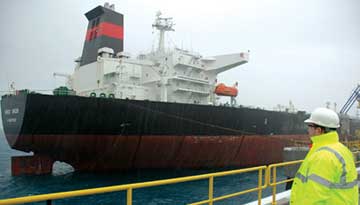  Left: On February 6, 2007, BTC pipeline celebrated the
100th cargo lifting at the Ceyhan Terminal in Turkey. The Knock
Sheen carried more than one million barrels of oil, a quantity
that took 26 hours to load. Photo: BP Left: On February 6, 2007, BTC pipeline celebrated the
100th cargo lifting at the Ceyhan Terminal in Turkey. The Knock
Sheen carried more than one million barrels of oil, a quantity
that took 26 hours to load. Photo: BP
BTC's throughput has
steadily increased as its facilities and pump stations have been
brought on stream since the completion of linefill in late May
2006.
Since the first tanker lifting at Ceyhan in June 2006, more than
73 million barrels (9.8 million tons) of crude oil has been exported
via BTC.
Current export via the pipeline is running ahead of expectations,
and it remains on target to achieve one million barrels per day
(approximately 50 million tons per year) in late 2008.
While the pipeline initially carried only Azeri-Chirag-Gunashli
(ACG) oil, the first delivery of Shah Deniz condensate into the
line was made in January 2007. It is expected that future volumes
will include those from the other side of the Caspian, possibly
commencing by the end 2007.
BTC is a world-class project, which is expected to make a positive
difference by bringing significant benefits to the region. By
avoiding the Turkish Straits, the pipeline will help relieve
the inevitable growth in oil-related traffic and associated environmental
risks, while creating substantial revenues for the transit countries.
It will also help strengthen economic and political links between
Azerbaijan, Georgia, Turkey and the West.
Caspian Energy
Centre
In September, BP on behalf of its partners re-launched the Caspian
Energy Centre (CEC) at the Sangachal Terminal. The re-launch
followed the completion of an extensive refurbishment and upgrade
program, which was undertaken in collaboration with the Houston
Museum of Natural Sciences.
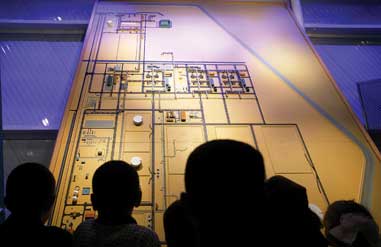  Left: Exhibits at the Caspian Energy Centre, the first
exhibition facility in Azerbaijan fully dedicated to the energy
industry and the specific sciences, which underpin the creation,
exploration and commercial use of hydrocarbons. Photo: BP Left: Exhibits at the Caspian Energy Centre, the first
exhibition facility in Azerbaijan fully dedicated to the energy
industry and the specific sciences, which underpin the creation,
exploration and commercial use of hydrocarbons. Photo: BP
CEC is the first exhibition
facility in Azerbaijan fully dedicated to the energy industry
and the specific sciences, which underpin the creation, exploration
and commercial use of hydrocarbons.
The facility is now equipped with a significant new series of
exhibits, which turn it into a world-class innovative science
center.
The Centre is designed as an educational tool, primarily for
use by secondary schools to help educate children in Azerbaijan
about the natural resources of this country and their uses in
everyday life.
"We believe specially tailored educational programs and
activities, interactive games and workshops organized by our
Centre will help enhance the basic knowledge of future generations
in Azerbaijan", says Ismayil Miriyev, CEC's Manager. Ismayil
is the first Azerbaijani to successfully complete an internship
in the Smithsonian Institute in Washington, DC.
"Learning through interactive games and other educational
activities is a universally recognized method of bringing science
to life, particularly for children. I'm really happy to be involved
in such an innovative and far-reaching initiative, which brings
to life the concept of an energy-related science centre in Azerbaijan,"
says Ismayil.
In addition, CEC will continue to accommodate visits of senior
government and state officials, representatives of partners to
the Azeri-Chirag-Gunashli (ACG), Baku-Tbilisi-Ceyhan (BTC), Shah
Deniz and South Caucasus Pipeline projects, local communities,
university students and the general public to update them on
the projects' progress and achievements. It will also serve to
inform the public of the projects' potential impact on economic
and social development of this country. Since its first opening
in May 2005, CEC has already hosted more than 6,000 visitors,
of whom 4,000 were schoolchildren from local communities in the
Garadagh district and the city of Baku.
Visit: CEC.az.
New Enterprise
Centre Opens
In October, BP on behalf of its partners in the Azeri-Chirag-Gunashli
(ACG), Baku-Tbilisi-Ceyhan (BTC), Shah Deniz and South Caucasus
Pipeline (SCP) projects re-launched the Enterprise Centre in
Baku following its refurbishment and upgrade.
The Enterprise Centre is the focal point for BP's and its partners'
efforts to maximize local content of their business in Azerbaijan.
This will happen through increasing both the number of companies
participating in their contracts, and the value of contracts
awarded locally.
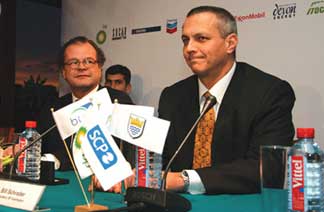  Left: Bill Schrader (right), President BP Azerbaijan
and Raymond Conway of European Bank for Reconstruction and Development
(EBRD) at the ceremony of contribution agreement to jointly support
private sector development in Azerbaijan. Photo: BP Left: Bill Schrader (right), President BP Azerbaijan
and Raymond Conway of European Bank for Reconstruction and Development
(EBRD) at the ceremony of contribution agreement to jointly support
private sector development in Azerbaijan. Photo: BP
To achieve this objective,
the new Enterprise Centre will work closely with the country's
leading companies, foreign investors and contractors, trade associations
and other groups to support local enterprises and encourage their
participation in BP contracts.
The Enterprise Centre was first established by BP and its partners
in May 2002 in support of local small and medium-sized enterprise
(SME) development.
Gulya Novruzova is the current Manager of the Enterprise Centre.
In its new role, the Enterprise Centre will lead all initiatives
aimed at meeting the ambitious target set by BP to double the
value of contracts placed with Azerbaijan-owned companies within
five years.
To reach this target, BP and its partners will implement plans
to provide transparent sources of capital for local companies
with potential to access the supply chain and a substantial enterprise
development program to help local companies gain further skills
and knowledge. All these plans are also designed to encourage
the non-oil sector and support enterprise development throughout
Azerbaijan.
Since the establishment of this facility, BP and its partners
have made a substantial contribution to the proactive development
of Azerbaijan's economy, enhancing the country's long-term economic
stability. BP places a higher priority than ever before on SMEs,
with the local enterprise development playing a central role.
In 2006 BP spent about $1.5bn, in- country, with over 440 SMEs,
over 60 state-owner companies, and more than 30 joint ventures
that include Azerbaijani partners.
Major Contracts
Awarded
A major air-diving and Remote Operational Vehicle (ROV) services
contract has been awarded to the local private company Dalgij
by BP as operator of the Azeri-Chirag-Gunashli oil and Shah Deniz
gas development projects.
This $1 million award is the local company's second contract
with BP. Dalgij builds on the company's competencies and continual
hard work to comply with BP's safety and performance expectations.
In addition to these direct contracts, Dalgij has been involved
in BP operations and project activities through various other
diving contractors in the Caspian.
In March 2004, Dalgij became a member of the International Marine
Contractors Association Diving & ROV Division (IMCA International)
and had eight local assistant "air" scuba diving supervisors
certified by IMCA in compliance with BP requirements.
In addition, Dalgij has been accredited by the American Bureau
of Shipping and the Russian Maritime Register of Shipping for
underwater ship inspection and repairs. This process required
both a huge effort from all of the Dalgij management and personnel,
and a considerable financial commitment to ensure that they met
international standards.
The company has successfully incorporated BP's rules for safety
and quality assurance for diving operations into their own policies.
In addition, its offshore workforce has been involved in BP's
trainings at the Sangachal Terminal, offshore survival and Helicopter
Awareness (HUET) certification.
Dalgij is the winner of BP's
and its partners' Best of Business award as the Company of the
Year. In addition, in December BP extended its engineering and
design services contract with another local company - Encotec.
This new agreement provides extension of the existing contract
with Encotec until March 2008 with a value increase up to $1million.
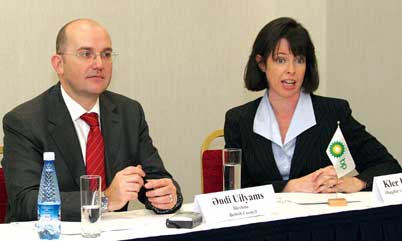
Above: Clare Bebbington (right), BP Director
of Communications and External Affairs, believes that BP is directly
investing in the country's future by supporting the development
of young Azerbaijanis' skills and careers. (Left) Andy Williams,
Director of British Council. Photo: BP
Under the extended contract, Encotec will manage small engineering
and modification projects in support of the Azeri-Chirag-Gunashli
(ACG), Shah Deniz, Baku-Tbilisi-Ceyhan (BTC) and South Caucasus
Pipeline (SCP) facilities. Services provided by Encotec may include
site survey and inspection, preparation of detailed technical
specifications and method statements for materials and installation
work, as well as preparation of detailed resource and work execution
plans, provision of documentation, design engineering, drawings,
layout, and final installation and commissioning report.
Encotec was founded in 2000 and today it is a well-managed multi-discipline
engineering company. Among other achievements, Encotec has received
ISO 9001:2000 certification by DNV (Den Norske Veritas) for engineering,
design and project management services for the oil and gas sector,
as well as other industrial and construction sectors.
Fifth Biodiversity
Competition
In December, BP, on behalf of its partners announced the Fifth
Biodiversity Competition award in Azerbaijan. This competition
is part of BP's and its partners' Biodiversity Strategy and supports
their commitment to undertaking a series of specific biodiversity
initiatives in the countries and areas where we operate.
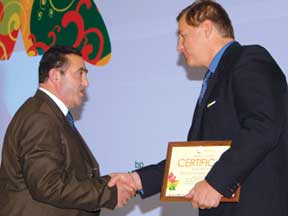  Left: Sujaddin
Guliyev (left) on behalf of the Society of Zoologists of Azerbaijan,
accepting First Prize at the Fifth Biodeiversity Competition
for their project "Laying the Foundation for the Monitoring
of Bezoar Goat (Capra Aegagrus) and Moufflon (Ovis Orientalis)
in Azerbaijan and the Development of Action Plan to Preserve
These Species." Gunther Newcombe, HSE Manager for BP Azerbaijan,
presented the award which is valued at more than $15,000. Photo:
BP Left: Sujaddin
Guliyev (left) on behalf of the Society of Zoologists of Azerbaijan,
accepting First Prize at the Fifth Biodeiversity Competition
for their project "Laying the Foundation for the Monitoring
of Bezoar Goat (Capra Aegagrus) and Moufflon (Ovis Orientalis)
in Azerbaijan and the Development of Action Plan to Preserve
These Species." Gunther Newcombe, HSE Manager for BP Azerbaijan,
presented the award which is valued at more than $15,000. Photo:
BP
The competition was
held in two categories - the best biodiversity project and the best biodiversity article and
video material.
best biodiversity project and the best biodiversity article and
video material.
This second category was introduced to promote Environmental
Journalism. The competition was announced in June 2006.
Some 80 applications were submitted - 61 projects from 46 organisations,
and 21 articles from 10 eco-journalists.
As a result of the multi-stage evaluation process, the main prize
was awarded to the Society of Zoologists of Azerbaijan for the
project "Laying the Foundation for the Monitoring of the
Bezoar Goat (Capra Aegagrus) and Moufflon (Ovis Orientalis) and
the Development of an Action Plan to Preserve These Species."
The value of the project is $18,670.
The second prize ($1,500) went to the non-governmental organization
Ecostyle-Azerbaijan for their project "Champion Trees of
Azerbaijan." The third prize ($1,000) went to the Society
of Zoologists of Azerbaijan for their proposal entitled "The
Animal World in the Azerbaijan Sector of the Caspian Sea."
In addition, four participants were highly commended by the judging
panel with an award of $500 each.
In the category for best Biodiversity Article and Video Material,
no First Prize was awarded this year as none of the submissions
fully met all of the requirements of the competition. The Second
Prize ($500) was awarded to Gulgiz Suleymanova for her article
"Seal Flu Virus" published in the Zerkalo newspaper.
The Third Prize ($300) was awarded to Sevinj Heydarova for her
series of articles: "Threat of Fire", "Threat
of Pesticides" and "The Golden Sands of Absheron are
Being Removed under the Cover of Night" published in the
Kaspiy and the Obozrevatel newspapers.
New Investment
BP has launched a major new scholarship program for Azerbaijan.
This scholarship initiative aims to provide outstanding Azerbaijani
graduates with the opportunity to pursue courses of studies in
the UK. It will enable at least 10 young scholars to get their
Master's degrees by attending university classes starting in
Autumn 2007. The program will cover a variety of discipline areas
including public administration, banking, finance and accounting,
and economics.
"We will continue to make education and training a particular
focus. We plan to continue to invest resources in such initiatives
since our experience suggests this is where we can make the most
effective and sustainable contribution. We believe that through
support for young Azerbaijanis' skills and career development,
we are directly investing in the country's future," says
Clare Bebbington, BP's Director of Communications and External
Affairs.
"We also believe that this program will enable young bright
citizens of Azerbaijan to become uniquely positioned to contribute
to their country's economic and social development and help their
nation build its prosperous future. We hope that upon return
to Azerbaijan from Western universities these talented young
people will be among those who are driving the positive changes
in this country." The program is administered by the British
Council on behalf of BP.
Emergency Medical
Service
In January BP and its partners in the Azeri-Chirag-Guneshli (ACG),
Baku-Tbilisi-Ceyhan (BTC) and South Caucasus Pipeline (SCP) projects
inaugurated a new emergency medical service facility in Kurdamir.
The facility will be operated as part of the Kurdamir Central
Hospital using mixed resources of BP's medical service provider
and specially trained local medical personnel.
The project is part of a major initiative called Regional Emergency
Medical Programme (REMP), which is designed to improve pre-hospital
and in-hospital emergency medical services in the areas close
to BP operated pipelines. These are the areas, which did not
previously have emergency medical service bases to international
standards. The REMP covers three major districts of Azerbaijan
along the BTC/SCP and Western Route Export pipelines - Kurdamir,
Yevlakh and Shamkir.
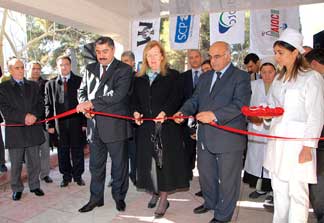  Left: Opening
Ceremony of the Modern Emergency Medical Service for the Kurdamir
region, a project sponsored by BP and its partners in the Azeri-Chirag-Guneshli
(ACG), Baku-Tbilisi-Ceyhan (BTC) and South Caucasus Pipeline
(SCP). Photo: BP Left: Opening
Ceremony of the Modern Emergency Medical Service for the Kurdamir
region, a project sponsored by BP and its partners in the Azeri-Chirag-Guneshli
(ACG), Baku-Tbilisi-Ceyhan (BTC) and South Caucasus Pipeline
(SCP). Photo: BP
A similar facility was launched late 2006 in Yevlakh while the
one in Shamkir will be operational in the near future.
The new facilities are designed to provide medical service to
local communities, not only BP-operated projects staff.
The work undertaken by the REMP includes renovation of existing
emergency departments of central hospitals in the three districts,
provision of new medical equipment and extensive training for
local medical personnel.
International Medical Corps (IMC) is the implementer of the REMP
on behalf of ACG, BTC and SCP partners.
The total cost of the REMP is $600,000 of which $450,000 is invested
by ACG, BTC and SCP partners. The remaining $150,000 comes from
the implementing partner IMC. In addition to this total cost,
BP and its partners will spend more than $300,000 (more than
$100,000 a year for three consecutive years) to cover operational
expenses for running the three facilities.
The REMP is implemented in collaboration with a wider and bigger
regional initiative called the Emergency Medical Development
Initiative (EMDI) funded by USAID, Hess, Chevron and the BTC
and SCP projects and implemented by IMC. This enables the REMP
to be more comprehensive and cost effective, as well as to cover
wider communities than those directly affected by BP-operated
projects.
"BP and our partners are proud to sponsor this important
health initiative. It will clearly bring benefit to the staff
involved in our onshore oil and gas operations through a faster
delivery of medical aid in the event of any emergency. But most
importantly these new and modern facilities will provide local
communities along our pipelines reliable access to high quality
emergency medical care. With their sophisticated medical equipment
and ambulances, these new hospital facilities will provide emergency
care from now on to those who will need it," says Rashid
Javanshir, BP's Vice-President, Onshore Operations.
New water purification facilities were opened in the Sigirli
and Karrar villages of the Kurdamir district by BP on behalf
of its partners in the Baku-Tbilisi-Ceyhan (BTC) and South Caucasus
Pipeline (SCP) projects.
The project is part of a larger initiative called the Improvement
of Provision of Potable Water (IPPW) which was launched in 2005
and covers those communities which are most affected by the lack
of potable water.
So far the IPPW Project ($190,000) has provided six communities
with water purification facilities using locally available technologies.
The IPPW has also created management structures for each facility
in the form of community-municipality owned limited liability
companies to manage water quality and revenues effectively and
transparently. It will provide access to potable water for more
than 6,000 people. These are communities of Sigyrly, Karrar Kend,
and Karrar Gesebe of Kurdamir District; Bergushad and Gulaband
of Ujar District; and Orta Laki of Aghdash District.
_______
Back to Index AI 14.4
(Winter 2006)
AI Home
| Search | Magazine
Choice
| Topics
| AI Store | Contact us
Other Web sites
created by Azerbaijan International
AZgallery.org | AZERI.org | HAJIBEYOV.com
|







